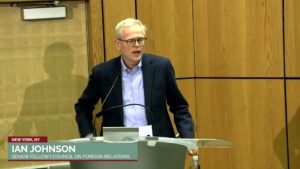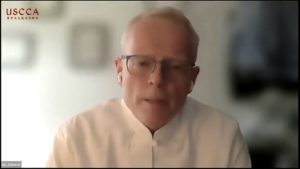 |
| Ian Johnson |
Religious groups in China have had different degrees of success, depending on their relations with the authorities. Among the Buddhist
Fo Guang Shan, has been the most successful, writes
author Ian Johnson of
The Souls of China: The Return of Religion After Mao in the New York Times. Has Fo Guang Shan changed China, or is China changing
Buddhism, he asks.
Ian Johnson:
Fo Guang Shan is perhaps the most successful of these groups. Since coming to China more than a decade ago, it has set up cultural centers and libraries in major Chinese cities and printed and distributed millions of volumes of its books through state-controlled publishers. While the government has tightened controls on most other foreign religious organizations, Fo Guang Shan has flourished, spreading a powerful message that individual acts of charity can reshape China.
It has done so, however, by making compromises. The Chinese government is wary of spiritual activity it does not control — the
Falun Gong an example — and prohibits mixing religion and politics. That has led Fo Guang Shan to play down its message of social change and even its religious content, focusing instead on promoting knowledge of traditional culture and values.
The approach has won it high-level support; President
Xi Jinping is one of its backers. But its relationship with the party raises a key question: Can it still change China?
Fo Guang Shan is led by one of modern China’s most famous religious figures,
the Venerable Master Hsing Yun. I met him late last year at the temple in Yixing, in a bright room filled with his calligraphy and photos of senior Chinese leaders who have received him in Beijing. He wore tannish golden robes, and his shaved head was set off by thick eyebrows and sharp, impish lips.
At age 89, he is nearly blind, and a nun often had to repeat my questions so he could hear them. But his mind was quick, and he nimbly parried questions that the Chinese authorities might consider objectionable. When I asked him what he hoped to accomplish by spreading Buddhism — proselytizing is illegal in China — his eyebrows arched in mock amusement.
“I don’t want to promote Buddhism!” he said. “I only promote Chinese culture to cleanse humanity.”
As for the Communist Party, he was unequivocal: “We Buddhists uphold whoever is in charge. Buddhists don’t get involved in politics.”
Much more in the New York Times.
Ian Johnson is a speaker at the China Speakers Bureau. Do you need him at your meeting or conference? Do get in touch or fill in our speakers' request form.
Are you looking for more stories by Ian Johnson? Do check out this list.

